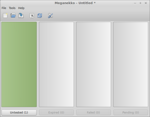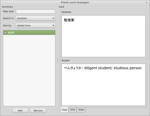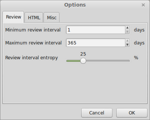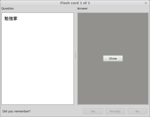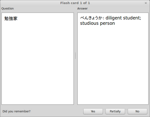Graphics
Initial commit
2014-10-23 16:57:27 +09:00
img
Updating README
2015-11-13 18:53:18 +09:00
AppMeganekko.cpp
Initial commit
2014-10-23 16:57:27 +09:00
AppMeganekko.h
Initial commit
2014-10-23 16:57:27 +09:00
Common.cpp
Initial commit
2014-10-23 16:57:27 +09:00
Common.h
Initial commit
2014-10-23 16:57:27 +09:00
DialogAbout.cpp
Initial commit
2014-10-23 16:57:27 +09:00
DialogAbout.h
Initial commit
2014-10-23 16:57:27 +09:00
DialogCard.cpp
Initial commit
2014-10-23 16:57:27 +09:00
DialogCard.h
Initial commit
2014-10-23 16:57:27 +09:00
DialogCardEditor.cpp
Initial commit
2014-10-23 16:57:27 +09:00
DialogCardEditor.h
Initial commit
2014-10-23 16:57:27 +09:00
DialogCardManager.cpp
Initial commit
2014-10-23 16:57:27 +09:00
DialogCardManager.h
Initial commit
2014-10-23 16:57:27 +09:00
DialogOptions.cpp
Initial commit
2014-10-23 16:57:27 +09:00
DialogOptions.h
Initial commit
2014-10-23 16:57:27 +09:00
FlashCard.cpp
Initial commit
2014-10-23 16:57:27 +09:00
FlashCard.h
Initial commit
2014-10-23 16:57:27 +09:00
FlashCardManager.cpp
Initial commit
2014-10-23 16:57:27 +09:00
FlashCardManager.h
Initial commit
2014-10-23 16:57:27 +09:00
FlashCardManagerXml.cpp
Initial commit
2014-10-23 16:57:27 +09:00
FrameMeganekko.cpp
Initial commit
2014-10-23 16:57:27 +09:00
FrameMeganekko.h
Initial commit
2014-10-23 16:57:27 +09:00
LICENSE
update license file
2019-04-28 11:59:19 -07:00
Meganekko.cbp
Initial commit
2014-10-23 16:57:27 +09:00
Meganekko.fbp
Initial commit
2014-10-23 16:57:27 +09:00
Meganekko.layout
Initial commit
2014-10-23 16:57:27 +09:00
Meganekko.sln
Initial commit
2014-10-23 16:57:27 +09:00
Meganekko.vcproj
Initial commit
2014-10-23 16:57:27 +09:00
Meganekko.xrc
Initial commit
2014-10-23 16:57:27 +09:00
Pch.h
Initial commit
2014-10-23 16:57:27 +09:00
Pch.h.gch
Initial commit
2014-10-23 16:57:27 +09:00
README.md
Update README
2022-07-14 14:20:03 -07:00
Resource.cpp
Initial commit
2014-10-23 16:57:27 +09:00
tinystr.cpp
Initial commit
2014-10-23 16:57:27 +09:00
tinystr.h
Initial commit
2014-10-23 16:57:27 +09:00
tinyxml.cpp
Initial commit
2014-10-23 16:57:27 +09:00
tinyxml.h
Initial commit
2014-10-23 16:57:27 +09:00
tinyxmlerror.cpp
Initial commit
2014-10-23 16:57:27 +09:00
tinyxmlparser.cpp
Initial commit
2014-10-23 16:57:27 +09:00
Util.cpp
Initial commit
2014-10-23 16:57:27 +09:00
Util.h
Initial commit
2014-10-23 16:57:27 +09:00
